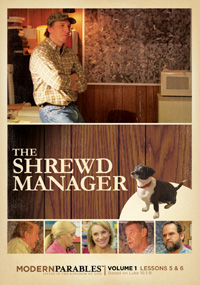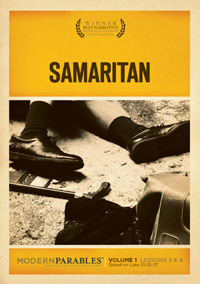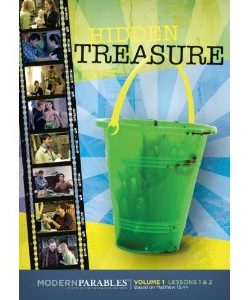
These last two weeks I’ve been playing The Shrewd Manager film and application video. The film is based on Christ’s parable found in Luke 16:1-9.
Jasper Crooks is a dishonest man through and through, but he’s also creative and calculating. As manager of a large tenant farm in the South, Jasper is responsible for keeping the books, but when the landowner discovers he’s been “misappropriating resources” (i.e. stealing) he fires Jasper. Jasper doesn’t want to leave town and work in the shoe factory, so before anyone else finds out that he’s been let go, he calls each of the renters and deducts their rent a sizable amount. In doing this he makes a lot of friends (who will be able to help him in his unemployment), and makes the landowner look good in the process. The landowner chooses to honor the rent deductions and lets Jasper go quietly.
What I Loved
- I loved that Compass Cinema chose to do this parable at all. This parable has always confounded readers because Jesus is using a dishonest man as the hero of his story. The film plunges people into thinking critically about one of Jesus’ trickier parables.
- They captured the comedic element of Jesus’ original parable. There is something humorous about Jesus’ story. Through trickery the manager is able to win friends and make his former master look good in the process. The manager’s creative and dishonest shrewdness is celebrated, despite the fact that his apparent generosity is with his master’s money. The film captures the humor of the situation well.
- The film does not try to make Jasper out to be better than he really is. Often interpretations of the parable will propose the idea that the manager was merely deducting his own commission from the rent. While a possible interpretation, it tries to paint the manager as a remorseful sinner and glosses over his continued dishonesty. The whole point of the parable is that Jesus is trying to show what “the sons of the world” are like (Luke 16:8). The scriptwriters did not try to make Jasper out to be a good man, just a shrewd man.
- The film creatively pulls Jesus’ parable into the present with close parallels. Rather than change the thrust of the story, the creators chose to keep the context and setting of the parable as a tenant farm. Doing this allows the viewer to get closer to the original parable without creating unnecessary parallels that fog up discussion.
- The film’s style was very appropriate to the pace of the story.This movie was shot in the style of Woody Allen. Woody Allen likes to use a lot of long, unedited shots where he lets the actors play out their parts. This creates a different kind of pacing for his films. In The Shrewd Manager, these longer single-shot scenes make the whole thing feel slower and more real to life. It is perfect for this movie because it takes place on a farm in Tennessee, and really emulates a slower, simpler pace.
What I Added
- There were a lot of questions in the class about exactly what the nature of “shrewdness” is. The word “shrewd” as a bad connotation for some people, and yet many modern translations choose to use the word “shrewd” to describe the dishonest manager (ESV, Amplified, GNT, Phillips, NASB). Other translations choose words like “prudent,” “astute,” “wise,” or “clever.” I included in our discussion a survey of some of the other texts in the Gospels where Jesus uses this same word (Matthew 7:24, 10:16, 24:45, 25:2,4,8,9, Luke 12:42)
Buy the DVD
You can purchase the DVD at the Compass Classroom store.










I’ve never heard of these videos, thank you for sharing and linking up at Simply Helping Him! Blessings!